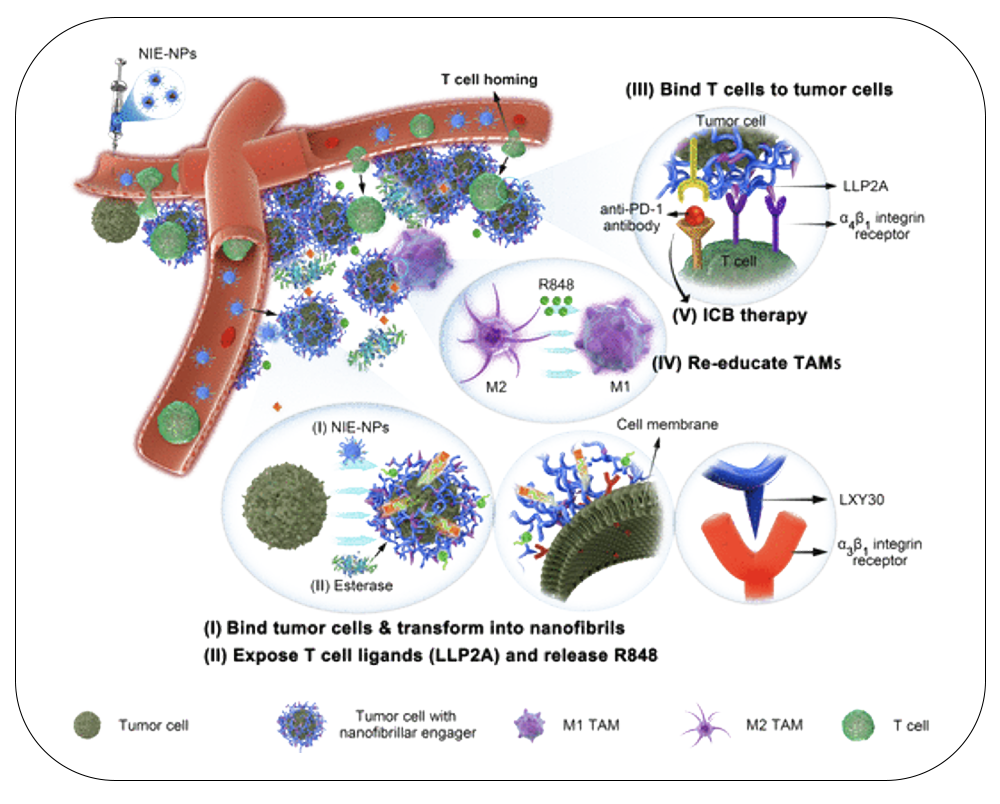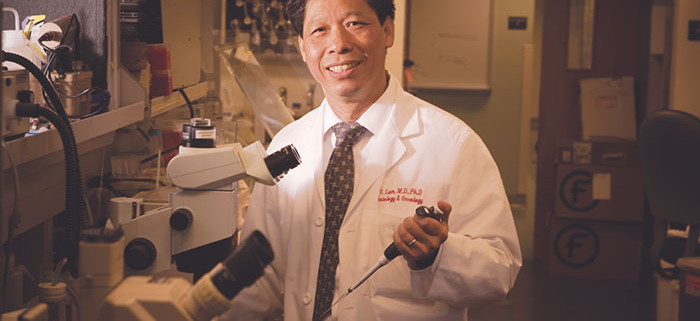UC Davis Enabled Biotechnology Startup Developing Peptide Nanoparticles to Treat Cancer Patients
By Neelanjana Gautam
Since joining the UC Davis School of Medicine in the fall of 1999, Kit Lam, now a distinguished professor in the Department of Biochemistry and Molecular Medicine, has been focused on translating laboratory findings to advance therapeutic and diagnostic care to treat cancer patients.
Lam recognizes the existing challenges in cancer research and patient care, and therefore, to help provide solutions and improve health outcomes, Lam collaborated with Anthony Maida, a scientific leader in the clinical development of immunotherapies (also a former graduate student in Lam’s Lab), to work on setting the foundation for a biotechnology company called T-NanoBio Therapeutics. The goal is to develop therapeutic products using nano immune-engagers built from peptides, which will promote immune cells to produce anti-tumor responses. The company recently executed an option agreement to access foundational intellectual property and commercialize the technology developed at the UC Davis Comprehensive Cancer Center.
Treating solid tumor growth with non-toxic peptide sequence
According to the National Cancer Institute, lung and bronchus, colorectal, pancreatic and breast cancers account for nearly 50% of all cancer deaths, while many patients remain incurable.
Lam’s work on human epidermal growth factor receptor 2 (HER2), published in 2020, demonstrated that transformable peptides can be used to treat breast cancer in mouse models. HER2 is a protein that plays a role in the growth of cancer cells. This protein is overexpressed (creating too many HER2 receptors) in over 20% of breast cancers.
The company is now developing a unique technology consisting of non-toxic peptides that can self-assemble and target tumor and cytotoxic T-cells, resulting in a potent anti-tumor response in multiple tumor indications. Lam believes this technology can be rapidly translated to the clinic to benefit patients. “It is important for our Cancer Center to be able to successfully translate laboratory findings to the bedside, such as developing “home-grown” anti-cancer drugs that benefit cancer patients. We are focused on that goal,” said Lam.
Applying Alzheimer’s research to nanoparticle drugs
Lam capitalized on existing work that illustrates how proteins aggregate together to form amyloid plaques, which may be the underlying cause behind Alzheimer’s and related diseases. He explained that the five amino acids peptide sequence KLVFF, derived from the amyloid protein, can make the peptides aggregate together. “Researchers have been using that sequence to create longer peptides to form nanoparticle fibers,” Lam stated. With that information available, Lam and his team investigated how they can apply it to nanoparticle drugs. Questions such as “how to apply it to actually treat the cancer –– whether by delivering drugs, or by phototherapy, or by immunotherapy,” prompted Lam and team to study the nanoparticles further.

“We applied our extensive nanoscience experiences to develop peptides that can self-assemble into nanoparticles and carry drugs. When injected intravenously, these nanoparticles can undergo transformation into nanofibers when interact with specific proteins on the tumor cell surface. The resulting nanofibrillar structural network displaying immunomodulators and immune cell binding peptides will mount a strong anti-tumor immune response against the tumors,” Lam said. “We are hoping that the first Phase 1 clinical trial of this novel agent will occur at our Cancer Center in the foreseeable future.”
Lam shared his excitement about the nanoparticles that the team developed. He said, even though immunotherapy has been around for many years, it’s not until the last 15 years that the impact of check point antibody therapy has been demonstrated in the clinic. “Our nanoparticle will augment what is already in the clinic to make many patients respond well to immunotherapy for not just a couple of cancers, but many cancer types and with higher response rate,” Lam said. “There’s still a lot of room for development, but with our experience, I think we can create something quite unique.”
The team received several grants from the National Institutes of Health and the Department of Defense to develop different nano platforms for cancer therapy. “In fact, we have some other nanoparticles in my lab that are actually working very well, too. We haven’t licensed those yet, but some of those are promising as well,” Lam added.
Media Contact
AJ Cheline, UC Davis Office of Research, 530-752-1101, [email protected]
Neelanjana Gautam, UC Davis Office of Research, [email protected]







